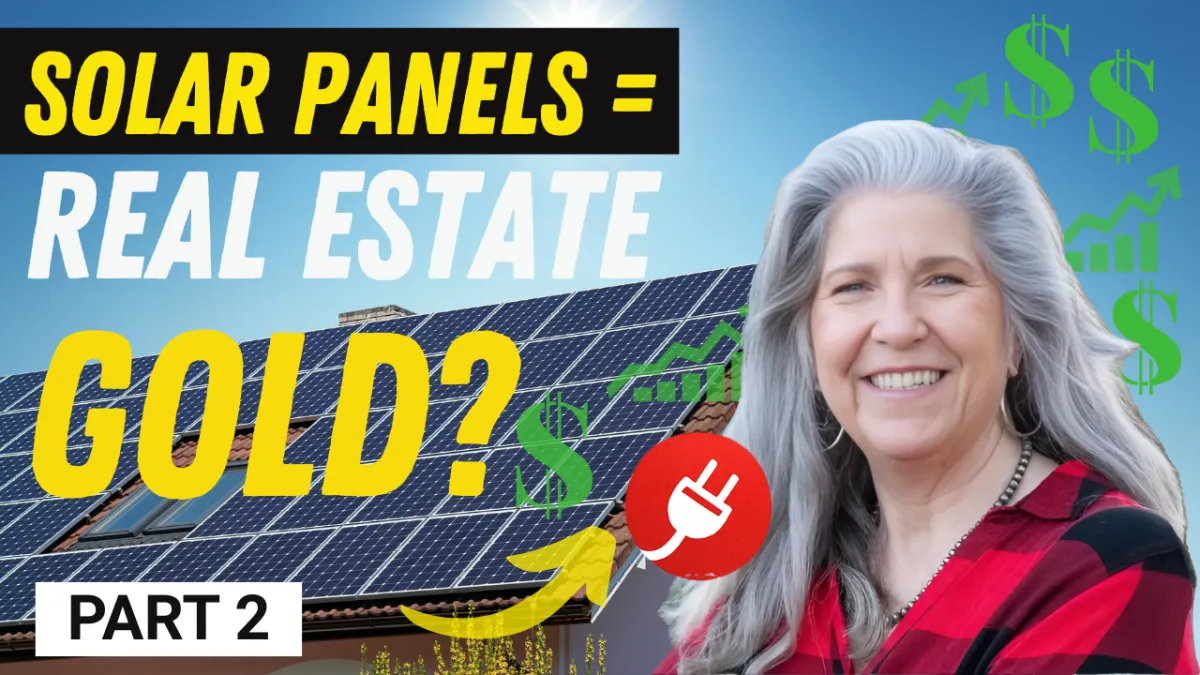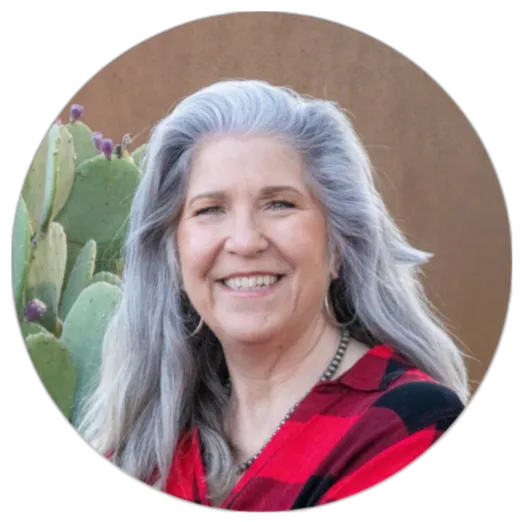
Solar Power & Real Estate: A Must-Watch for Buyers & Sellers! | Judith Barnett's Expert Insights Part 2
👉 Watch the full video on YouTube!
Link:
Prefer to listen? Click to hear this post!
Prepayment Now, that's something that I did a long time ago. I, that was probably 28. That was probably 2018 or 2019. It was one of the first solar deals I did. So my client, I'm helping her sell her home and she has solar. And the buyer asked, and this is something to keep in mind, we don't do it very often, but I think we should do it more, is the buyer asked my client.
To prepay the solar, the monthly solar fee to lock it in at a certain rate. So that's something to at least review and see if that's an option. I don't know if it is on everything, but it is possible for the seller to help out the buyer by prepaying some of the lease monthly payments they can prepay.
And that's actually a really good thing to do in situations where maybe it's really hard for the buyer to come up with, say, closing costs and things like that. Well, I can help you out by prepaying, say for the next four years, three years, whatever, two years, one year. for your solar lease. So that's something to think about.
And my client did it and it worked out. We negotiated it. They asked for X, we said Y ended up with Z. So there you go. All right. Oh yeah, I talked about my guy that had a loan. We didn't even know that he had to pay it off. It was like, oh my gosh, poor guy. And it was a manufactured home on leased land as well.
So those always sell a little slower. So I was really like, oh, we need to get this figured out. So then, Let's talk about loans on solar. Now, most loans, not all of them, but most loans on solar have to be paid off. However, there are some loans, and I'll refer to Good leap because that's the one I'm most familiar with, and we really don't have any issues working with them.
We like good leap. We like Good Leap because they're easy to work with and they help us out really well in getting the buyer and the seller's accounts kind of transferred pretty easily. They talk to us, they talk to the title agent, they talk to the buyer and the seller, it works much more smoothly. So if a client.
Has bought solar and they have taken out a loan through Good Leap, and they call that like a commercial loan. So the solar company usually presents this as an option. Okay? And so it may be other commercial loans, but again, it helps the solar company be able to sell more solar if they have options besides just lease, maybe you wanna buy.
So that's how they have a partnership with commercial loan companies. So what happens with those is that the seller gives permission for the buyer to apply for the loan. They have to qualify for the loan. And that's important when you're looking at people buying homes because you have to have the buyer qualify for the house.
And the loan. And if you have any other extenuating expenses like HOAs, all that's bundled into their monthly payment and what they can afford. So that's a very important thing to kind of evaluate if you can, before you put an offer in on a house because you hate to cancel an offer because your clients can't afford the extra payment from the
solar loan. Okay. But usually the solar loans go fairly smoothly. I can't say that it had a lot of issues with that. And they're usually locked in at a pretty decent rate. So whatever rate the seller of the house bought the solar for, that transfers to the buyer. Typically, not a hundred percent, but it does make it a more appealing situation for the buyer.
Okay. And the seller has to keep that in mind. Now again, the seller can choose to pay off that loan. There's no restrictions on that. They can prepay, they can pay it off. It can be part of the closing expenses for the seller. Okay? And then the buyer would just own the solar and it'd be over. Then another one that's speaking of loans.
This is like the HELOC one. You think I'd learn, you know, I Now I have. Now I have, but I had another person. It was like. I wasn't really so worried about this one because these people had money, thank goodness, but I was talking with them. They're selling a house that's almost a million dollars. They have solar on the house.
It's great. It's working wonderfully, and they had a large family, big house. It's generating plenty of kilowatts for everything they're running, including a spa and a pool. I mean, you name it, they had it all going on to. electric and, and their electric bill. Like nothing. It was just whatever the fee was that the electric company requires for you to hook up to their grid.
So I'm talking to the husband and we're getting ready, we're under contract, we're going through the closing costs, and the husband says, oh yeah, I have to pay off that solar loan. I'm like, what? He's like, oh yeah, there's a loan on the solar. And he had used the word. Owned repeatedly in the course of our conversations.
So I thought it was paid for. No. So I'm learning never assume anything. It's just like, okay. So he is like, I just, he knew this. They were very good at their finances. They understood all this stuff, thank goodness. But I was again, caught with my pants down kind of going, I thought you said it was owned. So very important for me to remember is it paid for or is it a loan and you'll own it when you pay out the loan.
So that's kind of that piece. And so solar, it's great. You do have to look at all these variables when you are buying and selling. You've gotta understand that it's not straightforward. And I will say that there are a lot, we've had so much difficulty with solar maintenance companies or the loan company for solar?
The lease company for the solar. Not so much good leap I'll keep saying that. They've been good, but there's just all of these, like communications is not very clear or upfront or who needs to do what. We're not sure. It kind of all happens behind the scenes, so we're asking our clients. What's happening?
Did you get it taken care of? Did they talk to you? Have you done the paperwork? Because we are out of the loop as agents, this solar companies don't talk to us. Title agencies do get involved with some of it because there's a UCC that needs to be released to the new owners. And that's something that I don't know a whole lot about.
But the latest story with one of those is, I can't believe this. So I sold a house. I was both sides of the, the transaction. So I listed the house and then one of my clients buyers loved the house and bought it. My client who owned the house, had paid for solar, 100% owned, did not owe anything, so it transfers okay.
You sell the house, we get it all done. The electric's connected up to the grid. Now here we are, almost a month after the fact, and the title agents reach out because she's doing some final paperwork and she finds out that they, there's, they won't release the UCC codes to, they're putting a lien.
They're holding onto it because they need proof that the solar has been paid for. I'm like, oh my God, this has never come up before on solar. That's paid for. But you never know. And that's the thing that when you're dealing with this, so now he's, she's calling the previous owner. Do you have proof she's calling the current owner?
Because I asked my seller to leave all the solar information behind so that in case anything came up they would have the paperwork. So hopefully it is, you know, getting resolved and I know it will. But who expected that? I mean, it's just a very surprising situation repeatedly. I tried to find this information.
I'm gonna have to call my clients and ask. So again, I had a house listed and my clients had solar on their house and their garage. They had owned solar, meaning it was a loan, but they would own it when the loan was paid off and they had leased solar. Please don't ever do that. That was the most confusing scenario I've ever had to deal with.
So they had owned with a loan and they had leased with a loan. So they were paying a lease and they were paying a loan, and I don't remember which side it was, it was the leased or loan. But my clients were like, didn't wanna pay this. Fee, which if they'd stayed in the house, they would've paid and it would've locked in their rate at a certain like $48 a month.
So it had to be the loan. And if they didn't pay it, it would go up to $68 a month. And they're like, well, we're not gonna be living here. Why would we pay this? So they're like, okay, done. They could not sell the house without paying to lock in the solar monthly rate. I'm like, that doesn't make any sense.
But in the contract, in the tiny, tiny print it said that, and that's sort of my other lesson to you horror story is read the fine print. I know those leases go on and on and on, but I'm telling you, they paid, I think $4,200 to the solar company to lock in the rate for the new owners. How does that make sense?
And we tried to fight it but it was like not happening that solar company. So again, my clients were told one thing and in their opinion they felt lied to, which I can say it kind of feels like that. So they are not ever gonna buy solar again 'cause they are so upset with the solar company for lying to them.
so that was their experience. So going back to my little handouts here, it's very quick, and I'm sorry this I'm going on for so long, but this is sort of a hot topic. Arizona is getting more and more and more solar, and so we have to learn how to deal with this and we need to educate our sellers and our buyers.
So this part of what I'm trying to do is help you if you're a seller, understand I need to really understand all this stuff. And if you're thinking about buying solar, you need to understand all this stuff. And if you're buying a house that has solar, you really have to understand is their solar system gonna meet your needs?
And that's not to say you can't add to a solar system, but just keep in mind, you gotta run all the numbers. You know, you gotta run all the numbers. 📍 In 2019, right before COVID was the highest year so far that solar was sold in Arizona and then it went way down for 2020 and 2021. And now it has steadily been growing and increasing now that we're through the COVID thing.
So it is definitely, you know, , it's coming. It's not gonna go away and we just have to understand it better. So it says on here, and I'm just reading this, this is 2024, March of 2024, the percent of Arizona's electricity, the state of Arizona's electricity is from solar is 10.15%. So Arizona is using solar in the government buildings and whatever companies, corporations to, you know, defer some of their expenses.
There are 364 solar companies currently operating in Arizona. Now, speaking of solar companies, I'm just gonna say this, there are a lot of little solar companies that pop up because it's a hot commodity and you can make money fast doing solar, installing, selling solar, and unfortunately, and again, be very careful when you're talking to the sales person 'cause they may not be well educated in all of the nuances of the contract.
They're just trying to sell solar 'cause they're probably based on commission. So it's important to really read that solar contract. Do not get excited by the numbers and all of that. Oh, it's gonna give you all this. It's gonna save you this money. It's only gonna cost you this much per month. You gotta really understand the details of that contract because once you sign it, you're committed.
Okay? And whatever you sign is what's gonna impact when you go to sell the house. There are a lot of solar companies that start up like Vision solar, and out of business. The company that installed my client Solar that now they're like another company is saying we're not gonna release the UCC because we need proof that the solar is paid for the company that installed solar panels gone.
So a new company is maintaining the solar panels, meaning there's, they watch to make sure the inverters working, the solar panels are working, and then if there's any issues, then he's alerted and they will come and fix it. Obviously he has to pay for it, so, but it's like, yeah, there are a lot of solar companies.
There are a lot of installer companies. Really research and check them out to make sure they're legit. How long have they been in business? What's their guarantee? What if something happens? How is your solar gonna be completed, hooked to the grid and maintained once it's on your roof? Those are very important 'cause solar companies seem to come and go.
A few don't like Sunrun Tesla. They have been around a long time. I feel very safe in recommending them. Okay. But anyway, that, that's a growing industry. There's solar's not going away. We just have to understand it better. I know that there's gonna be a lot of questions. Again, this is me just trying to take what I've gleaned in the years of working in real estate and interacting with different solar companies, different solar situations, leased.
Owned, owned but have a loan, you know, all of the scenarios that I have experienced. So I can help educate you both on the selling side and the buying side, as well as what does it really mean? Is it really beneficial for you to really evaluate your electric use before you buy solar? To confirm, is it really gonna be saving you money because you don't wanna be paying a solar bill, whether it's a lease or a loan and an electric bill, like a big one.
You know? So those are things to just keep in mind and do your due diligence. Please do your due diligence. I have saying that to me too, to ask more questions, see more information. if somebody says owned, I better ask, do you own it outright or do you still pay on that? I hate being calm with my pants down.
It's so embarrassing. I'm just saying I don't like it. Any who? If you have questions, please comment below, send me an email, whatever. , and if you like this, please like and subscribe below. We're trying to build our following and we appreciate you. Have a blessed and glorious day.
Resources:
https://drive.google.com/file/d/1bApmH-XhosPgh0AIMhxIV5eu33v1cqQw/view?usp=sharing






